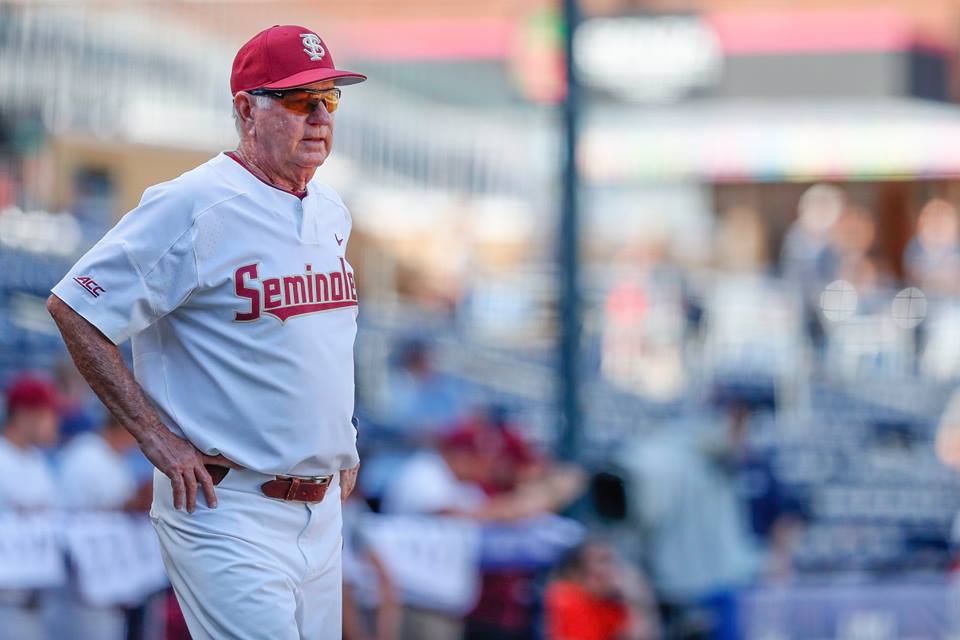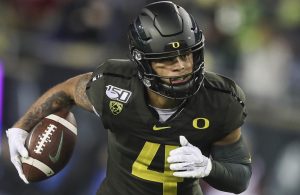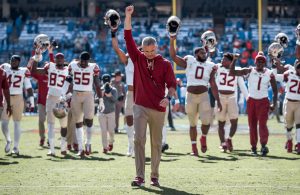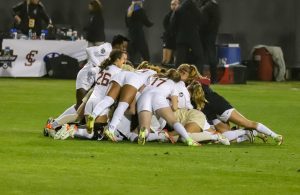- Sunday Seminole Summary: FSU Football Adds Pair of WR Transfers
- Sunday Seminole Summary: FSU Football Exits ESD With Top-15 Class
- Sunday Seminole Summary: FSU Soccer Tops BYU for Third National Championship
- Sunday Seminole Summary: FSU Soccer Advances to National Championship Match
- Seminole Sunday Summary: FSU Soccer Heads Back to College Cup
- Seminole Sunday Summary: FSU Soccer Reaches Sweet 16; Football Tops Boston College
- Seminole Sunday Summary: FSU Soccer Wins ACC, Advances to Second Round of NCAA Tournament; FSU Football Rallies Past Miami
- Seminole Sunday Summary: FSU Soccer Tops Wake on OT to Advance to ACC Final
- Seminole Sunday Summary: FSU Football Crushes UMass for Third Straight Win
- Seminole Sunday Summary: FSU Soccer Stays Perfect with Pair of Wins
Devil’s Advocate: Mike Martin’s Lack of a National Title
- By Clint Eiland
- Updated: June 28, 2018
 Jeremy Esbrandt/D'Vel Photography/FSU athletics
Jeremy Esbrandt/D'Vel Photography/FSU athleticsAs part of my limited television watching during childhood, there was one show on ESPN Classic that I always tuned in to. It was a show called “Top 5 Reasons You Can’t Blame…” and I partly credit it with my affinity for sportswriting and discussion (also: Cheap Seats).
The premise of the show is that the host Brian Kenny plays a devil’s advocate of sorts, examining controversial moments from the sporting world and arguing that the usual targets of blame don’t deserve it — at least not completely. Some of the more famous topics include Steve Bartman and the Chicago Cubs’ 2003 playoff fiasco; Kobe Bryant and the breakup of the Los Angeles Lakers; and Miami Dolphins’ quarterback great Dan Marino for never winning a Super Bowl.
In honor of my long-gone childhood and the sports offseason, we’ve decided to do something similar. Fans of Florida State athletics know all too well that baseball head coach Mike Martin has never won a national championship.
They were painfully reminded of that fact in the most recent postseason, where the Seminoles obtained a national seed yet somehow managed to get swept in their own regional. Most have put blame on Martin for both his lack of preparedness in the first game and his pitching decision in the second game. Now, Martin is returning for one more go-around in 2019, but nobody expects a College World Series title anytime soon.
Should we be looking at the whole situation differently? Martin is the object of ire for many fans spoiled by championships. Yet there are some very pertinent reasons that you cannot totally put FSU’s lack of a baseball title on Martin. Do I fully agree with every point here? Nope. Does Martin deserve some blame? Of course.
But perhaps there are a few things fans are forgetting when talking about the whole situation. Here is our first edition of Devil’s Advocate.
CWS Format
There is a serious argument to be made that the College World Series had the worst championship format in collegiate athletics up until 2003. From 1950-87, the tournament was purely a double-elimination affair. There was no real “championship round”, so if you lost at the beginning of the CWS, you were playing to stay in the rest of the time.
That’s exactly what happened to Florida State in 1986 — the first year where it was runner-up under Mike Martin. FSU lost to the eventual national champion Arizona on June 6, so it had to play both Oklahoma State and Miami to keep itself in the tournament over the next two days.
The Seminoles did win those games and eventually got a rematch against Arizona, who they lost to again. Sure, FSU had a chance to win at least one over the Wildcats — but wouldn’t a straight 3-game series have been more conducive to how baseball is actually played?
1986 isn’t the most egregious example however.
From 1988 to 2002, the College World Series instituted a single championship game. Not a series, but one singular game. You lose and you’re done. Florida State was once again runner-up in 1999 thanks to this singular game, where it faced off against the Miami Hurricanes and lost 6-5.
Finally in 2003 the format was changed to include a 3-game championship series. It was long overdue, since both the previous solutions essentially put a team at the mercy of random occurrences. Part of professional baseball’s appeal is that it virtually guarantees the best team wins in the end.
If you get to the final series, you have at least four chances to prove that you are the ultimate champion. That was not the case for over 50 years in college baseball. Who knows what might’ve happened in 1986 and 1999 if FSU was given a more fair shot at the title.
Inherent College Baseball Recruiting Difficulties
College baseball is unique among the major college sports when it comes to recruiting. High school baseball prospects can choose to play professionally if their draft offer meets their asking price.
If it doesn’t, they can choose to sign with a Division I college and play at least three years at the school. It gives them a lot of flexibility with their options and ensures that they are making the best decision for their future.
It also means that in almost every situation that arises, the most talented potential signees will just go straight to the professional leagues. There’s basically no reason to pass up the money/opportunity when it meets your demands.
So when Mike Martin is recruiting players like Joe Mauer, Francisco Lindor, Scooter Gennett, Brendan Rogers, etc. he knows that there’s a chance they will never put on an FSU uniform despite wanting to do so.
Obviously, this applies to every college baseball coach in America. Martin is not unique in this regard, but it also undeniably adds more volatility to the game. You can identify the best talent all you want, but it won’t mean anything if they get a phone call they’ve been waiting for from a professional franchise.
Bad Timing
Why did 2011 LSU not win a BCS National Championship? Why did the 1990s Utah Jazz not win an NBA Finals? Why did the 1999 FSU baseball team not win a College World Series?
All these questions have the same answer: bad timing.
Many fans will tell you that the 1999 FSU team was the best they’ve ever seen. Former slugger Marshall McDougall agrees with that at least. That team started the season 11-0, went on a 21-game win streak, had seven players named to All-American teams, and finished the regular season at 46-10. The Seminoles were absolutely a national championship caliber team.
The only problem? They ran into arguably the best Miami baseball team of all-time. The Hurricanes were an incredible 9-0 in postseason play, hitting a momentum high that no team could match. In almost any other year, that Florida State team could’ve had a good path to a national championship victory. But it simply didn’t have good timing.
Same deal with the 1989 team. Another dominant FSU squad who ran into the eventual national champion Wichita State Shockers — the one title team in program history.
Yes, this is a somewhat defeatist attitude that absolves the coaching of the losses. Not every loss can be blamed on “the better team won.” But after looking at some of the incredible FSU teams and who they lost to, it becomes clear that they are a lot like the sports franchises mentioned above. All-time great teams that were unfortunate enough to co-exist with even better all-time teams.
Sheer Luck
Perhaps more than any other sport, baseball relies on an incredible amount of luck. All sports do at some level. But at the end of the day, there are so many things out of a head coach’s control with baseball. A pitcher could be having an elite year and still give up four runs in one inning. A player could be hitting sub-.200 and all of the sudden smack a home run in a crucial moment. Fielding errors, wild pitches, bloop singles — the possibilities are endless.
No one knows it better than Mike Martin. Whether it was the 1997 team running into Auburn legend Tim Hudson, Blair Varnes getting injured in 1999, Tyler Holton getting injured in the first game of the year, or a myriad of other happenings, the Seminoles simply don’t have good luck. There’s pretty much nothing Martin can do at that point.
We hope that you enjoyed this edition of Devil’s Advocate. If we get a good enough response, we will continue to do pieces like this throughout the summer. We don’t expect you to radically change your opinion of Martin, and we aren’t trying to absolve him completely of blame. But we do hope that we’ve given you some added perspective on how to view his legacy.




You must be logged in to post a comment Login